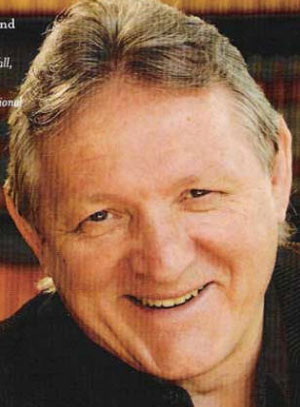|
|
James Ragan is an award-winning poet, playwright, essayist, and screenwriter. Translated into twelve languages, he has authored eight books of poetry including In the Talking Hours, Womb-Weary, The Hunger Wall, Lusions, Selected Poetry, The World Shouldering I, Too Long a Solitude, and co-editor of Yevgeny Yevtushenko, Collected Poems. He has read for six heads of state, including Mikhail Gorbachev and Vaclav Klaus and for audiences in China, Japan, England, France, Sweden, Brazil, and the Czech Republic, among others. In 1985, he was one of four poets, including Seamus Heaney, Robert Bly, and Bob Dylan, invited to perform at the First International Poetry Festival in Moscow. Ragan’s honors include three Fulbright Professorships, two Honorary Doctorates, the Emerson Poetry Prize, nine Pushcart Prize nominations, a Poetry Society of America Citation and the Swan Foundation Humanitarian Award. Ragan’s plays, The Landlord and Commedia, have been staged in the U.S., China, Greece, and the Soviet Union. He has worked as a screenwriter at Paramount Pictures and later in various production capacities during the making of THE BORDER, THE HOUSE, and the Academy Award winners THE GODFATHER and THE DEER HUNTER. He has a Ph.D. and served for 25 years as the Director of USC’s Professional Writing Program. He is the subject of "Flowers and Roots," the 2015 Arina Films documentary on his life in the arts. In 1996, BUZZ Magazine named Ragan one of the “100 Coolest People in Los Angeles: Those Who Make a Difference”.
James Ragan’s poems are satisfying and distinctive, full of arresting collocations and striking phrases. U.S. Poet Laureate, Richard Wilbur
James Ragan dominates the art of image, the art of poetic line, and the art of poetic narration with insight that marks major poets. Nobel Prize Nominee, Miroslav Holub
|
|
The Hunger Wall
After walking to the bridge at Karlova,
we found the river where at dusk the swans
dipped their beaks into the falls for sanctuary.
The trees closed in for shade. We gazed
through willows to the opposite hill, a single
light from a room growing thick with sadness.
Solemn smoke now cooked the evening meal.
We were just about to treat our hunger well
when, out of sunlight, undeclared,
a shaded mass of stone began to stretch
its neck along the slope.
It would scan the water for a quarter hour
before the foliage rubbed its throat,
some internal hunger now assuaged
for only moments, then again, the impulse
thumbed like whalebone on a drum.
The poplars began to rustle, A hawk
spiraling, like an aspen deep in chatter,
betrayed its nest to block the sun.
The dam below rose up to boulder water
as if to show how easily wars are won.
They feed the hunger wall, the waitress points,
the fingers in her skirt rubbing coins
her hand is shoring up to feed the past.
I don’t want the poor to endure me, she says
King Charles said to those he paid, as he watched
their faces, building borders, hunger for a wall,
as she faced the smoldering Vltava, watching hunger well.
from The Hunger Wall
Moving Everest
I think sometimes the earth
moves quietly beneath me.
I feel its skin shudder
through the alchemy of wind,
as when the sun squints,
amazing itself
with embattled brilliance,
Everest quivers
into an avalanche of clouds,
and the ice melts
into rivulets of light.
In time rain, and all
of nature is haloed at high ground.
A rock blossoms
out of mud, and shade
out of the groves
of peach flowers.
Across the dark
obsidian fields
trees flow greening
into a racing herd of colors
among the foothills
of deodar. At dusk
with the wet rag
of the moon
wiping my windshield,
I see the high fallow buck
sprinting a doe
into the hollow.
All lovers find their way
into such affection
through the trust of another.
Some mind it by solitude,
some by the measure
of a mountain,
moving.
from Too Long a Solitude
|

|
| |
|
© 2016 James Ragan
|
|
|